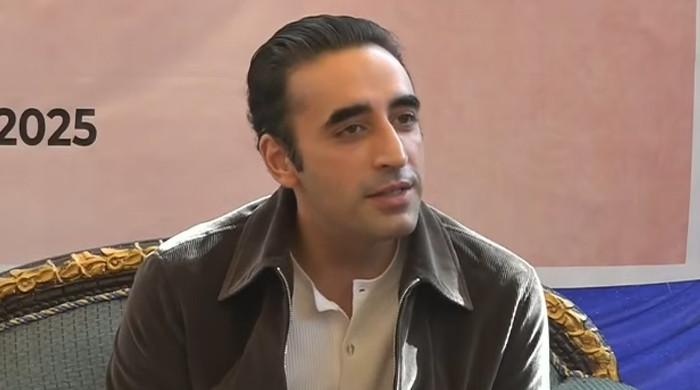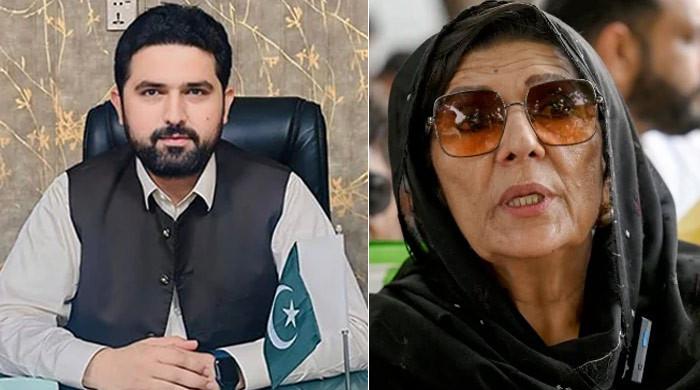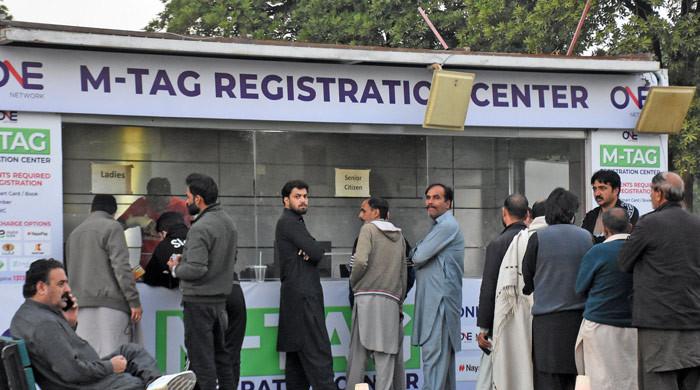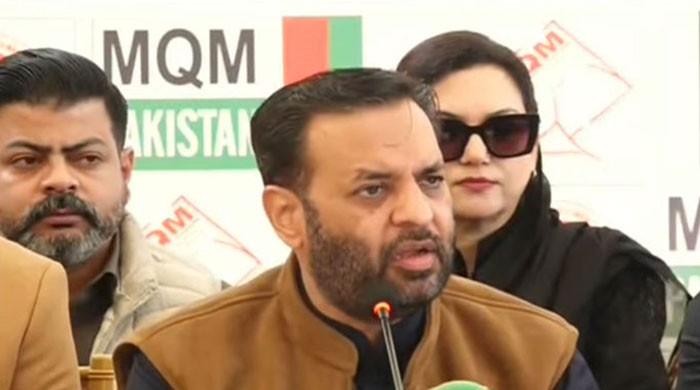Limited funds, political considerations hamper effective distribution of rations in Karachi
Local committees constituted for identifying needy families working without coordination
April 20, 2020
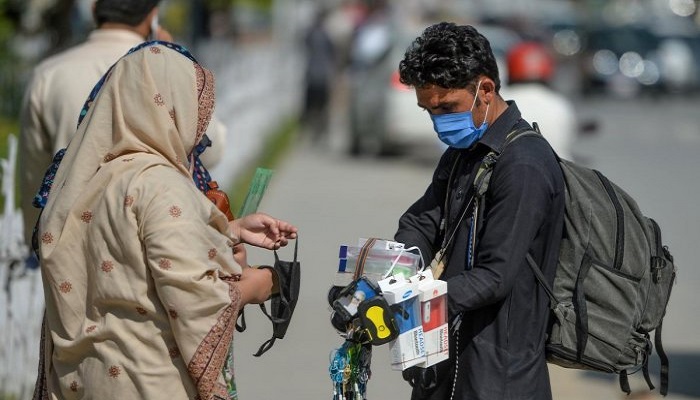
The disjointed efforts of the relevant authorities and the inability of the political parties to rise above political considerations have marred the distribution of rations to needy families under the Sindh government’s Corona Emergency Ration Package programme in District Central, West and East of Karachi, The News reported on Monday.
Severe discrepancies have been taking place during the disbursement of rations as seven-member committees that were constituted for each union committee (UC) for the identification of needy families in the respective UCs are working without coordination.
The emergency ration programme was announced by the Sindh government to help the needy families during the lockdown regime. In the first phase of the relief programme, a total of Rs580 million were released with Rs20 million allocated for each district of the province.
In the second phase, a total of Rs167.6 million was released for the Karachi division that includes six districts of the city. The money, however, was not distributed equally, as districts with a higher number of underprivileged people received more funds.
According to an order issued by the Karachi Commissioner Office, of the Rs167.6 million, the lion’s share of Rs40.08 million was received by District West. District Central and District East got Rs31 million and Rs30.3 million respectively.
The respective shares of District Korangi and District Malir were Rs25.6 million and Rs20.9 million. The least amount of Rs18.7 million was provided to District South.
As rations needed to be distributed due to an emergency situation, the government asked the deputy commissioners not to go for bidding for the procurement of food items.
Seven-member committees
The Sindh government formed seven-member committees at the UC level to identify the needy families and distribute rations procured with the help of the released funds among them.
The same committees are also supposed to gather data of the needy families for all the other relief programmes announced by the federal and provincial governments.
The convener of each committee is the assistant commissioner of the relevant town as a representative of the deputy commissioner (DC) of the relevant district. The other six members of the committees are the chairmen of that UC (union council or union committee), the councillor of the ward or town or municipality or a member of the district council, chairman of the local Zakat committee of the respective UC, a representative of a prominent NGO, a notable personality of the area, a prominent female social worker or female councillor or any member co-opted.
The purpose of the committees, according to the notification of the provincial coordination department, is to identify the needy persons such as daily wagers, labourers, hawkers and other impoverished people residing in the relevant union committee, union council or ward.
The committees are supposed to scrutinise and maintain the record of the beneficiaries and distribute ration bags among the deserving people at their doorstep.
They have also been told to file a daily distribution report with the Social Protection Strategy Unit and ensure social distancing during the distribution of rations. “Only house-to-house distribution will be made from 5am to 7am or late night,” read the commissioner’s order.
Items in ration bags
Karachi Commissioner Iftikhar Shallwani, in an order issued earlier this month, notified the standard operating procedures (SOPs) for the distribution of rations among the needy families.
Each ration bag is to include 10 kilograms (kg) of wheat flour, five kg of rice, two kg of sugar, two litres of cooking oil, one kg each of daal moong (split mung bean), daal masoor (split lentil), daal channa (split gram) and white channa (chickpea), 250 grammes each of laal mirch (red chilli powder), haldi (turmeric powder) and dhania (coriander powder), and one packet of salt.
Various districts have procured the ration bags from different vendors. In District Central and District East, the ration bags have been procured from the Imtiaz Supermarket, while District West has decided to procure the bags from the Azaan Enterprises.
These vendors are providing ration bags to the DC offices, from where they are to be distributed to the needy families. However, the mechanism of distribution varies from district to district.
District Central
The worst scenario of the rations’ distribution seems to be in District Central that has a total of 51 UCs for which as many seven-member committees have been formed for the identification of needy families and the distribution of ration bags among them.
However, The News has learnt that such committees have not been working in a proper manner as there is no coordination among the members. Each member of the committee has been identifying needy families on their own and distributing the ration bags as per their will without any checks.
The committees must have made a consolidated list of the needy families in the respective UCs after every member had given their input, but as all the individual members of the committee are working in isolation, they are making their own lists and submitting them to the DC office to collect ration bags.
Speaking to The News, Muttahida Qaumi Movement-Pakistan’s (MQM-P) elected chairman of District Central UC-21 Naeem Uddin disclosed that each committee member of his UC had formed their own list of the needy families and submitted it to the DC Central’s office.
“I was asked to submit a list of 40 beneficiaries in a particular format in the Microsoft Excel sheet,” he said, adding that a few days later, he got ration bags for only 28 families. “Is this a joke to an elected representative?” he asked.
The UC-21 has four impoverished areas: Khandu Goth, Wahid Colony, Moosa Goth and North Nazimabad Block-G. “I got at least 500 applications for rations in my office from these areas, I submitted a list of 40 and received 28,” he said.
Since other committee members have been submitting their own lists, there is also a possibility of duplication and someone getting more than one ration bag. When asked about this, the UC chairman said he had no idea of the lists prepared by other committee members who are from the Pakistan Peoples Party (PPP), Pakistan Tehreek-e-Insaf (PTI) and Jamaat-e-Islami (JI).
He said he tried to meet the DC Central in this regard but the latter not once met him or received his phone call. Another MQM-P chairman of District Central UC-14, Mushtaq Ahmed, told The News that the Zakat committee chairman in the committee for his UC was a member of the PPP, the co-opted member was from the PTI and the notable person was also from PPP.
There are around 1,300 Christian families in the UC-14’s Godhra Area. In the best case scenario, he said, some pastor could have been included in the committee for better identification and effective distribution of rations among the Christian community.
“Every member of the committee has been working in isolation,” he remarked. When The News contacted UC-14 Zakat Chairman Muhammad Aslam, who is a resident of North Karachi’s 11-F, he readily accepted that he was a PPP worker. He shared how the MQM-P, PPP and PTI members in the committee are being separately provided ration bags to be distributed among the needy families of the UC.
When DC Central Farhan Ghani was contacted for his comments on the situation of rations’ distribution in District Central, he shared how complicated the political dynamics of District Central are. Half of the members of the National Assembly and Sindh Assembly are from the MQM-P and other half are from the PTI, while the funds are coming from the PPP government, he said.
“Each political party wants to have more and more bags,” he said, adding that initially his office decided to give ration bags door to door as per the SOP set by the Commissioner Office, but then unscrupulous elements began looting ration bags.
“We [District Central] have less funds and the largest number of UCs in the city,” Ghani pointed out, adding that each member of every committee was given a maximum of 30 bags.
When asked why lists were collected from each committee member separately, he responded that there seemed to be no harmony among the members of the UC-level committees. As for the chances of duplication, he explained that after collecting lists from all the members of the 51 committees of the district, they had sorted the lists out on a computer and made sure that there was no duplication.
Ghani explained that in the first phase of the rations’ distribution, they gave away 200 ration bags in each UC of the district. He said once each member of the committee is given ration bags, they keep check on them through their staff.
District West
District West of the city comprises 41 UCs and is the largest district of the city in terms of population. The discrepancies in the mechanism of rations’ distribution seems to be similar to District Central here.
The MQM-P’s UC-8 chairman of Qasba Colony, Munawar Naqvi, lamented that there had been no coordination among the seven members of the committee notified for his UC.
“We had no idea about other members of the committee initially. We got to know them through our channels,” he said, adding that he personally tried to ensure that one single list of the needy families was sent from his UC but the Zakat committee chairman submitted his own list.
Against 950 needy persons Naqvi included in his list, he received ration bags for 60 only. Responding to this, Orangi Division Assistant Commissioner Jehangir Ali Shah said that these committee members can never sit together as “all they do is politics”.
Meanwhile, DC West Fayaz Solangi said every committee member wants to submit a separate list of the needy families. “How can I give 500 bags to each UC with limited resources,” he remarked, adding that on average, they had given 300 bags to every UC in his district.
“One should not forget that the poverty rate in District West is 50 to 70%, which is the largest among all the districts of the city,” he pointed out and requested the people to not expect 100% perfection in the mechanism for the distribution of rations.
Solangi said they had made sure that no ration bag was directly handed over to any political party. The distribution started on April 5 and its second phase had also been completed, he added.
The ration bags in District West were procured from the Azaan Enterprises which, the DC said, had offered the district management very economical rate of roughly Rs2,000 per bag. They also hired a transporter for the distribution of ration bags for which they had to incur an extra cost.
“During the distribution, we made sure that an official of the DC office and some members of UC committees were present,” Solangi said.
District East
Of the 31 UCs in District East, a few of the elected chairmen are affiliated with the PPP and JI, and a majority of them belong to the MQM-P.
A large number of the chairmen of all the three parties have complained that they have been sidelined by the DC office in the distribution of rations.
JI’s Junaid Mukati, the elected chairman of District East’s UC-21, lamented that the control of the rations’ distribution in his UC is under the Zakat committee chairman who is also a member of the seven-member committee of his UC and a worker of the PPP.
He said all the seven members of the committee of his UC had turned in the lists of the needy families separately. He added that of the list of 1,300 needy families he submitted, hardly 250 could receive ration bags.
Initially, he shared, only those families that were on the lists of the PPP members received rations bags, “but when we complained, the DC handed over the distribution process to [ride-hailing service] Bykea.”
Meanwhile, the independently elected chairman of the UC-6 of Manzoor Colony, Muhammad Nawaz Olukh, said he had distanced himself from the entire rations’ distribution process as he was provided with just 50 ration bags after he had submitted a list of 300 needy families in his UC.
He said there had been no coordination between him and any other member of his UC’s seven-member committee.
However, the MQM-P’s elected chairman of Central Jacob Line’s UC-10, Muhammad Mursaleen, said the list of needy families in his UC was prepared after proper coordination.
Responding to queries of The News on Whatsapp, DC East Ahmed Ali said needy people in all the UCs of District East were provided rations by the relevant assistant commissioners with due diligence. He said on average, 600 to 800 bags were distributed per UC. He said they had chosen the Imtiaz Supermarket as their vendor “as we cannot compromise on quality.”
Originally published in The News




